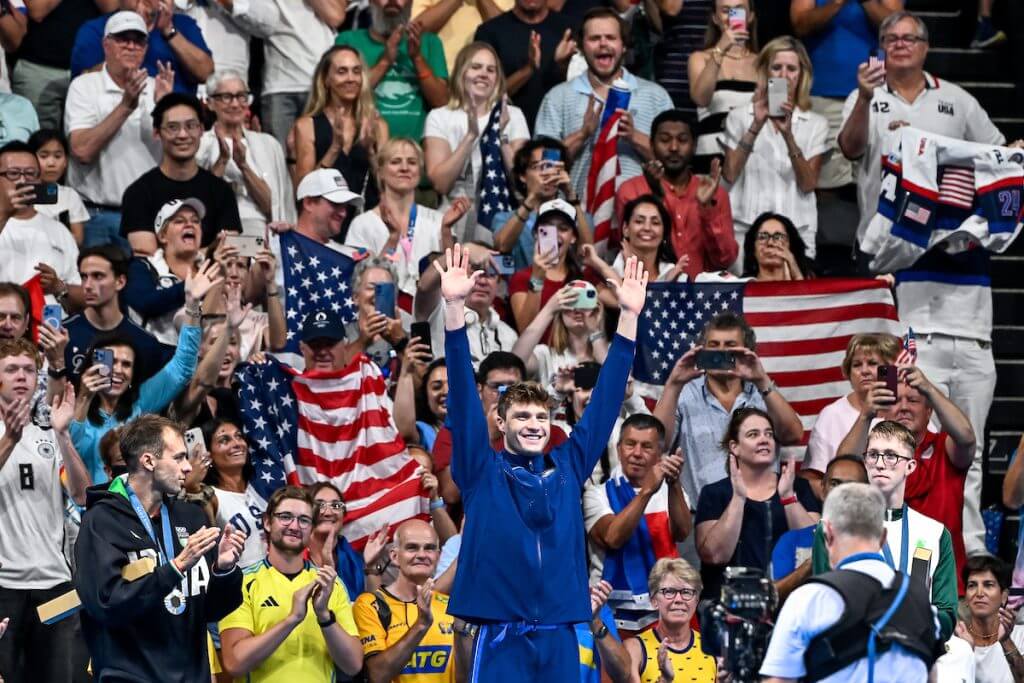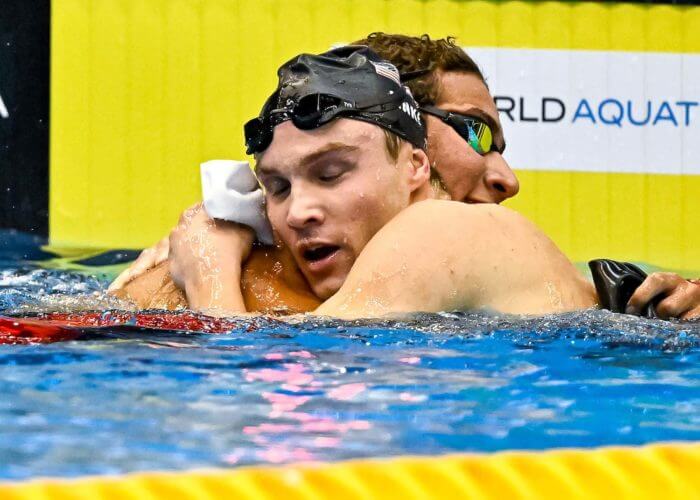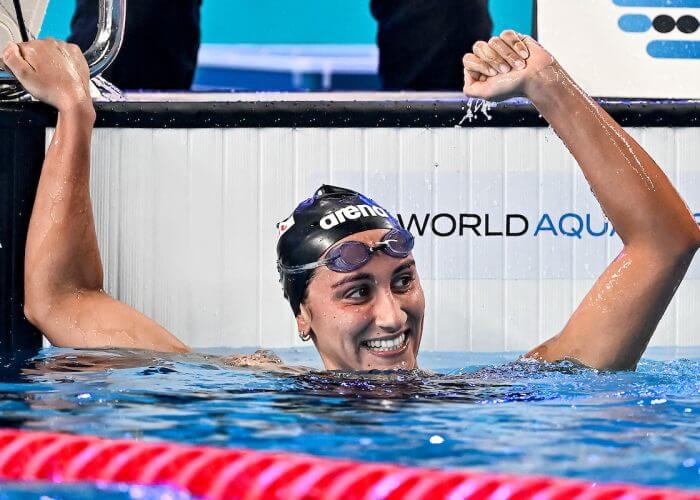A Distance Swimming Renaissance, and Why Today’s Athletes Offer Can’t-Miss Action

A Distance Swimming Renaissance, and Why Today’s Athletes Offer Can’t-Miss Action
In arguably the greatest male race for the U.S. team at the Paris Olympics, Bobby Finke defended his 1500 freestyle Olympic gold medal in stunning fashion, taking down controversial Chinese swimmer Sun Yang’s 12-year-old mark. Finke performed at the 11th hour for the American team. A swimmer who normally takes charge over the final 50 meters, the Florida Gator took control from the first stroke, opening up to a lead and never looking back.
At the 2022 World Championships in Budapest, a then 27-year-old Gregorio Paltrinieri put up a time of 14:32.80, the fourth-fastest performance in history (at the time it was the second-fastest ever). Swimming out of Lane One, the Italian distance legend was at one point 2.4 seconds under world-record pace, before falling away over the final 50 meters.
The Legacy
Since 2019, 13 of the top 25 performers in the history of the longest event on the swimming program have set personal-best times. I’ve dubbed this era the ‘distance renaissance,’ as it’s hard to find a period in history when this much distance talent has converged at the same time. While all eyes have been on the excitement of the 50 freestyle, pay just as much attention when the 1500 free comes onto the program.
When looking at the most recognized names in the history of swimming, besides Katie Ledecky, distance swimmers do not occupy much space in the mindset of the average swimming fan.
In events like the 50s of strokes, the race is over in just over 20 seconds, and the medalists are decided in the final meters, or even the final stroke. In an 800 or a 1500, the talent present in the field can lead to a similar level of excitement, just stretched over 16 or 30 times the amount of laps.
Hundredths of a Second

Photo Courtesy: Andrea Masini / Deepbluemedia / Insidefoto
Two examples have been given of athletes leading their heats by a sizable margin, so let’s highlight a distance event separated by hundredths of a second. Ahmed Hafnaoui stunned the world in 2021 when he snuck into the final of the 400 freestyle, and then proceeded to win by less than two tenths of a second. Hafnaoui backed up the talent he showed two years later, when he battled Finke to the final touch to win the 2023 world title in the 1500 free by .05.
Even Ledecky has seen challenges over the last Olympic quad. After winning gold by 12 seconds in the 800 free in 2016, Ledecky won her third straight gold in Tokyo by 1.3 seconds. A larger margin than the aforementioned .05, but a margin enough to produce excitement as the race progressed. Ledecky prevailed by a similar margin in 2024, once again against Ariarne Titmus.
A common rhetoric around distance swimming is that the events are ‘too long,’ and not as engaging as a 50, 100, or 200. This is supported by the fact that NBC, the longtime owner of the Olympic Broadcasting rights in the U.S., skips to an ad in the middle of the 800 & 1500s. While specific viewer count is unavailable in a race-by-race structure, the average swim fan is unlikely to keep their eyes peeled to the TV screen for a race lasting eight or 15 minutes, featuring names they mostly don’t recognize. The buy-in for a 50 freestyle in terms of audience retention is significantly cheaper.
The question then becomes how to make that buy-in a more attractive option for the average swim fan? Let’s examine two races to see how that could be accomplished
2024 Olympics – Men’s 1500 Freestyle
Sun Yang’s world record loomed large over the men’s 1500 free Olympic final in Paris. He had set the mark en route to winning gold in 2012, before a series of doping scandals and controversy resulted in a four-year ban (which expired earlier this year).
In prelims, Ireland’s Daniel Wiffen produced the top time of the field by more than two seconds in a 14:40.34, a time that would have won silver three years prior. Italy’s seemingly ageless distance star Gregorio Paltrinieri sat second in 14:42.56. Behind them, the entire field from third to eighth was represented by a razor thin margin in the longest pool race on the program: Just 1.39 seconds. Not to be forgotten in the sixth slot was reigning Olympic champion Bobby Finke.
Finke attacked the final, an uncharacteristically bold swim from the NCAA champion. In the intervening years between Tokyo and Paris, Finke had patented the come from behind strategy. It netted him medals in the 800 and 1500 free at every major international meet.
Paltrinieri made the Olympic final of the 1500 free in 2012, placing sixth. In 2016, he upgraded to gold, before placing fourth in Tokyo. At the age of 29, the Italian also sat under world-record pace for nearly the entire race. Ultimately, he finished with the silver in 14:34.55, using his strong open water background to hold his position for nearly the entire swim. The 800 freestyle Olympic champion from just a few days prior, Wiffen, earned a second medal for Ireland in bronze. Four national records were set across the eight swimmers, and the entire field swam under 15:00.00, the fastest field in Olympic history by eight seconds.
2019 World Championships – Women’s 800 Freestyle
Katie Ledecky is the undisputed greatest distance swimmer in history. She has won the 800 free on four occasions at the Olympic Games, and has won the 800 freestyle six straight times at the World Championships, and usually by a sizable margin.
At the 2019 World Championships, however, Ledecky pulled out of the 1500 free due to illness, and dropped the 400 freestyle for the first time in years to future rival Ariarne Titmus. She made a return to help the U.S. claim silver in the 800 freestyle relay, and qualified for the 800 free final in an unfamiliar second-seeded position.
In Ledecky’s absence, Italy’s Simona Quaderella won gold in the 1500 free, setting a new national record in the process.

Simona Quadarella
Quaderella and Titmus challenged Ledecky with every stroke of the final, with the lead changing multiple times. Ultimately, Ledecky proved why she’s the greatest of all time, winning gold by over a second in an 8:13.58. Quaderella added to her medal haul with silver, and the rising Titmus won bronze. Six of the eight swimmers swam under 8:20, one of the fastest fields in the history of the event, and a race that keeps you on the edge of your seat for all eight minutes.
Imagine the excitement of seeing someone lead a field of swimmers by a dramatically large margin. Or two athletes facing off head to head in a test of strength and grit, going stroke for stroke to the wall. Now take that excitement and thrill and stretch it to eight or 15 minutes and you’ve now seen how exciting distance events can be.
But what about a race that’s two hours long?
The Open Water Effect
I will admit I only began watching open water swimming this year. I will also fully admit that I deeply regret not watching open water swimming before this year.
With the 2024 World Championships representing the Olympic qualification for Paris in the 10k, the swimmers competing had a tall task ahead of them. Place in the top-16 to earn your place in Paris. The medalists from the same event in 2023 were already pre-qualified.
Throughout the 1 hour and 57 minute race, I watched the lead change multiple times between Brazil’s Ana Marcela Cunha, Australia’s Moesha Johnson, and Spain’s Maria de Valdes. Not once in the nearly two hour marathon was Dutch Olympic champion Sharon van Rouwendaal in the lead. Until the very end that is. With just an Olympic size pool’s distance left in the race, van Rouwendaal made a late charge through the field and out-touched de Valdes by 0.1.
A 10,000 kilometer race came down to a tenth of a second.
Van Rouwendaal employed a similar strategy to win her third straight medal in Paris. She is the first swimmer in history to win three straight open water medals.
As a first time viewer of open water swimming, the excitement of the race got to me and led to my yelling waking up my family in the middle of the night.
In Conclusion
I will always love watching sprint events. After seeing Sarah Sjostrom win the sprint double in Paris, I was cheering through my TV screen. Florent Manadou winning his fourth medal in the 50 free in a row cemented his legacy as one of the greatest in history. However, with the right combination of commentary, the narrative of distance events can change dramatically.
Audiences become accustomed to ads in the middle of the race, signifying for them that this is an acceptable time to take a break from the action. Replace the advertisements with commentary highlighting the talent of the field, the different race plans, the different strokes or techniques and how they carry the swimmers through the water.
By adopting this approach, it would create an interesting jumping-on point for the casual swim fan.
As a college distance swimmer, I hope I’ve done something to convince you of the excitement of my favorite races offered.
Next time you watch a Worlds or Olympics, lock into the 800 or the 1500 and give the race a chance.




This is awesome! I love your point about the importance of continuously streaming long distance races, without interruptions. You have inspired me to root for those long distance swimmers!
As a distance swimmer, I appreciate this
Totally agree. Both men’s and women’s 1500 and 800 were incredibly exciting races to watch. The length of time the race takes builds the excitement.
Loved both open water races. What gutsy swims with currents and tactics. 2 hours just went by in no time at all.
The women’s 10k has an incredible field of swimmers. Well deserved win by all medal winners.! Absolutely fantastic!
I am now a big fan!